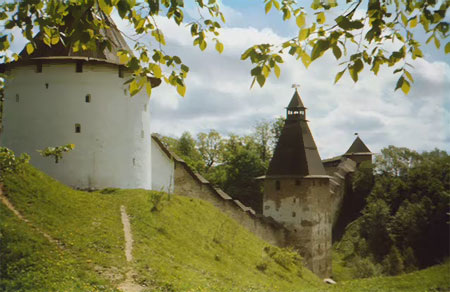 |
| The Pskov-Caves Monastery |
It was the same as in earlier days, when boys would run away to work on ships, yearning for the open sea. Only, the call of God was incomparably stronger. We hadn't the strength to overcome it, or more exactly, we unmistakably felt that if we do not respond to it, we will lose ourselves irretrievably. And even if we should obtain the whole rest of the world with all its joys and successes, we wouldn't need it or enjoy it.
We felt terribly sorry for everyone, first of all for our parents, who didn't know what to do, and couldn't understand. Next, of course, we felt sorry for our friends and girlfriends, and for our beloved professors, who had spent the time and energy to come to Pechory to "save" us. Truly, we were so sorry for them that we would have given our lives for them! But not the monastery.
This all seemed wildly strange and inexplicable to them.
I remember that I had already lived for several months in the monastery when Sasha Shvedtsov arrived. He came on Sunday—the only free day there was in the monastery during the week. After a wonderful Sunday service and monastery meal, we young novices were stretched out blissfully on the cots in our large, sunny, novices' cell. Suddenly the door opened wide, and at the threshold appeared a tall, young fellow, our age— around twenty-two—in "commercial" (as we use to say) blue jeans and an expensive jacket.
"You know, I like it here! I think I'm going to stay!" he announced to us, without even saying hello.
"Tomorrow they'll put you to work in the stables or mucking the sewers and we will see whether or not you'll stay," I thought with a yawn. Probably all were thinking the same thing as they looked over the big city number who had flown into the ancient monastery.
Sasha turned out to be the son of a major trade representative, who had lived with his parents in Peking, London, and New York, and had only recently returned to Russia to study in the university. He had come to know God a half a year before. He didn't know very much, but he apparently knew the main thing, because from that time on he was tormented by the total meaninglessness of everything around him, and by an interminable, forlorn restlessness, until he found the monastery. Immediately grasping that he had found precisely what he was looking for, he didn’t even send his parents word about his new dwelling place. When we reproached him for his cruelty, he said that his parents would definitely not understand, and his dad would find him anyway. That is in fact what happened.
Sasha's dad came to Pechory in a black "Volga" and demonstratively raised Cain—with the police, the KGB, with school friends and college girlfriends he had enlisted, and with all the instruments we have gotten used to for pulling people out of monasteries. This went on for a rather long time, until his father was finally convinced to his own horror that it was all in vain, and Sasha was not going anywhere.
The treasurer, Fr. Nathaniel, tried to console the guest from Moscow as well as he could, saying to him, "Well, give your son up as sacrifice to God. He will be a Pechory hieromonk, and you'll be proud of him…"
I remember the desperate howl that filled the monastery: "Never!"
That was Sasha's father. He simply did not yet know that Fr. Nathaniel was clairvoyant; otherwise, he wouldn't have gotten so nervous. Sasha really did become a hieromonk, and is the only one of us present in that sunny novices' cell on his first day in Pechory who is still serving in the Pskov-Caves Monastery today. Sasha's dad, Alexander Mikhailovich, began working with me in the Donskoy Monastery in Moscow, and later in Sretensky Monastery, as the manager of our book warehouse. He was doing this work for the Church when he departed for the Lord, having become a most sincere man of prayer, and seeker of God.

Yours,
Ian McWethy